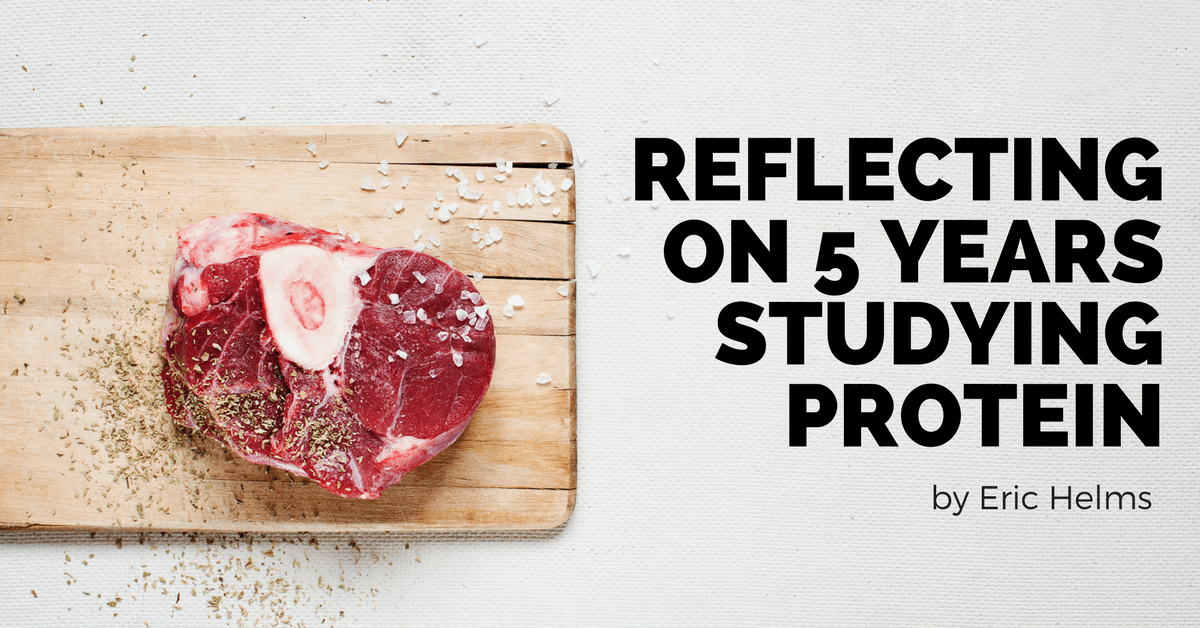Note from Greg:
This guest post comes from Eric Helms. If you don’t know Eric, he’s a successful coach for 3D Muscle Journey, an INBA natural pro bodybuilder, a scientist who’s going to defend his Ph.D. dissertation in the next month or two, and an all-around brilliant human being. If you didn’t know already, he’s one of my partners (along with Dr. Mike Zourdos) for MASS – a monthly research review breaking down the latest science that’s directly relevant to strength and physique athletes. I reached out to Eric to be a part of MASS because he’s at the forefront of this field, as I think you’ll be able to tell from this article.
For those who don’t know, I’ve been an “applied-protein researcher” since 2012. Really, I am interested in anything related to strength and physique sports, so my research interests are broad (within these confines), but a fair amount of my time is spent on protein intake. In 2013, my first peer-reviewed article was published ahead of print in the form of a systematic review on protein intake in dieting, resistance-trained, non-obese individuals. I concluded it with an advisement that such individuals should consume 2.3-3.1g of protein per kg of LBM per day while dieting to maintain as much muscle mass as possible.
At the time, this position was relatively controversial. Most sports nutrition protein recommendations fell in the range of 1.4-2.0g of protein per kg of total bodyweight per day for resistance-trained athletes. There was the odd guideline recommending slightly higher intakes, but almost no one adjusted recommendations for periods of energy deficit. That said, there was a single review that acknowledged a caloric deficit might require higher intakes, with guidelines that coincided with mine. Specifically, the legendary protein researcher Stu Phillips recommended 1.8-2.7g of protein per kg of total bodyweight per day for dieting athletes in his 2011 publication on optimal protein intakes for athletes (which is nearly identical to what I recommended, just not adjusted for LBM).
However, I have also been challenged on the veracity of my recommendations, and, in my opinion, with good reason. My bro, the badass Bayesian bodybuilder himself, Menno Henselmans and I went a few rounds in October 2015 debating whether there is any evidence to support consuming over 1.8g/kg of protein per kg of total bodyweight per day in any condition – deficit or not. This was a great debate. I say this not because of the content of the information (although a protein nerd will love that aspect), but more so because we had a respectful, professional debate where we showed a higher respect for the evidence, and one another, than for being right. Not to pat ourselves on the back too much, but I hope we can serve as an example to others who disagree and debate in our community.
My position evolved after the debate (as it should after any quality debate in which you are exposed to new and reasonable opposing viewpoints). My current position looking back on the debate can be summarized by the following points:
- The hypothesis that protein intakes above 1.8g/kg of total body weight will help dieters maintain muscle mass does not have strong support.
- However, there is a paucity of research of any appreciable time length that directly compares moderate (1.4-1.8g/kg) to high protein intakes (>1.8g/kg) in dieting lifters, so there’s also not a strong case against higher protein intakes for dieting athletes.
- If protein intakes above the moderate level of ~1.8g/kg do assist lean mass maintenance, they probably don’t help everyone equally due to individual differences. Also, any lean mass sparing effect from a high protein intake would likely be relatively small.
- ~80% of studies comparing higher versus lower protein intakes in people performing resistance training don’t show a significant difference favoring higher or lower protein intakes. Of the remaining 20%, every study that I’m aware of except a single one shows a benefit of a higher versus lower protein intake for either body composition or resistance training performance.
- Given point number 4, it’s probably a good idea to recommend protein on the high side of what appears to be optimal, to ensure individuals who respond better to higher intakes are covered, since the likelihood of harm seems very low.
- It is quite possible that there are benefits to higher protein intakes when dieting apart from muscle mass maintenance. Rather, the benefits might come in the form of satiety, diet satisfaction, or mood state.
Since our debate, the world of protein research has continued to evolve. Recently, Lemon’s group published a study that examined the whole-body protein requirements of bodybuilders using a technique that avoids some of the pitfalls of the traditional nitrogen balance method. They found that, on average, 1.7g of protein per kilogram of total body mass was the requirement on off days from training (they speculated it might be higher on training days). Likewise, they acknowledged that some individuals have higher protein needs than others (one study on female cyclists found a mean requirement of 1.6g/kg, but one individual needed 2.8g/kg!). With this individual variability in mind, they reported the upper end of the 95% confidence limit, which was 2.2g/kg, and suggested it as a guideline to avoid many individuals falling below their optimal intake.
While I can’t go into too many details at this stage, I am also a part of a team (along with a great number of talented researchers) led by Stu Phillips working on a meta-analysis of protein intakes for resistance-trained individuals. All I can say at this stage is that our recommendations are similar to those of the Lemon study above. Likewise, we also report the mean and the upper end of the range to cover the bases for individuals who would benefit from higher protein intakes. However, this was a meta-analysis on protein intakes during energy maintenance or surplus. Unfortunately, we don’t have enough data yet to conduct a protein-intake-while-dieting meta-analysis.
If you’re interested in more research-backed training and nutrition information, you can download the first issue of our research review here.
However, new research is being published that is relevant to dieters. Antonio conducted a series of studies (1, 2, 3, 4) in which he pitted very high protein intakes (~3-4.4g/kg) against “normal” high intakes (~1.8-2.2g/kg). In aggregate, they found that less fat mass was gained in the very high protein groups compared to the semi-high protein groups, even when the subjects attempted to follow a caloric surplus. This implies that perhaps protein intakes above traditionally recommended ranges could be useful due to their effects on TDEE and satiety. However, research directly investigating calorically restricted lifters is needed to confirm this supposition.
Also, true dieting studies have been conducted recently. In a 2016 study, Longland observed that a protein intake of 2.4g/kg of total body weight was more effective for promoting fat loss and LBM gain compared to 1.2g/kg during a 4-week dieting period in detrained, overweight men (they had prior resistance training experience but were not currently training at the start of the study). While this study bridges the gap a bit compared to previous work where low protein intakes (1g/kg or 0.8g/kg) were compared to high protein intakes, 1.2g/kg is still a relatively low protein intake.
Even more recently, researchers reported that after 8 weeks of energy restriction, a pre- and post-workout whey-supplemented group of resistance-trained men performing bodybuilding style training maintained more muscle mass and gained more strength than a pre- and post-workout carbohydrate-supplemented group, which gained more muscular endurance. On average, the whey-supplemented group consumed a daily average of ~3g/kg of protein, while the carb-supplemented group consumed ~2.6 g/kg. To date, this is probably the most appropriate trial to assess the question of whether additional protein above traditional recommendations is beneficial for lifters while dieting.
However, while this study assessed well-trained lifters following a realistic diet while performing realistic training for 8 weeks, and while it used a reliable method of assessing body composition (hydrostatic weighing), it did have one confounding variable. In this study, not only was a high protein intake (2.6g/kg) compared to a very high intake (3g/kg), but also nutrient timing differed between groups. The whey-supplemented group consumed the additional protein around training, which could have influenced the outcomes. That said, if there is a benefit to peri-workout protein intake when total protein intake is high enough (which it easily should have been in both groups), the magnitude of that effect is generally very small. However, it’s worth noting that the prior protein timing meta-analysis only included two studies on trained lifters. Of the two, one found that consuming additional protein (plus carbohydrate and creatine) around training versus away from training led to more hypertrophy and larger strength increases, while the other did not find a beneficial effect with the same experimental setup. So, it’s possible that protein timing does make a meaningful difference for well-trained lifters, but not for untrained lifters. The difference in protein timing seems to be the more logical explanation for the results than the additional 0.4g/kg of protein consumed when both groups were already consuming in excess of 2.5g/kg. As always, more studies are needed to flesh out the details.
So, while it is difficult to say with absolute certainty that a higher protein intake will preserve more lean body mass during a diet, what can be said with certainty is that a protein intake in the range of 1.1-1.3g/lb (2.5-3g/kg) would not be harmful despite it being above traditional guidelines, and there is evidence that intakes in this range (and higher) appear to be more satiating (as field tests have shown a lack of weight gain despite intentions to create a caloric surplus). Finally, as I found in my study on protein intake while dieting, they may positively affect mood state compared to lower intakes.
So, what would I recommend today looking back on the last 5 years?
Well, based on everything, I think ~0.8-1g/lb (~1.8-2.2g/kg) is probably the highest intake you’ll benefit from in terms of enhancing strength or mass gains when you’re not in a deficit. Higher intakes are fine, but the only benefit would be for people who tend to overeat in the offseason and want to limit their calorie consumption to prevent excess fat gain.
While dieting, the jury is still out concerning whether there’s a benefit from an intake higher than 1.8-2.2g/kg for muscle retention. However, there probably are some benefits in terms of satiety and potentially mood. That said, I wouldn’t go too high, as excess protein can displace your caloric allotment for carbs and fat. Don’t throw the baby out with the bathwater and end up with a sub-par diet in terms of variety, micronutrient density, and adequate nutritional support for training. Thus, I’d cap dieting protein intake at ~2.8g/kg of total body mass, or roughly 1.3g/lb.
Read Next
If you value scientific information about strength and physique sports, you should subscribe to MASS: our monthly research review. You can find out more information about it here, or download the first issue for free to check it out.





